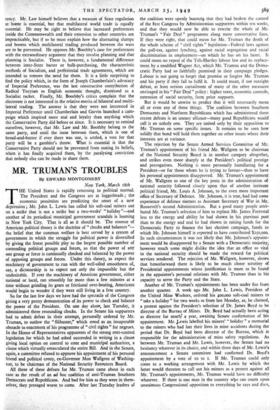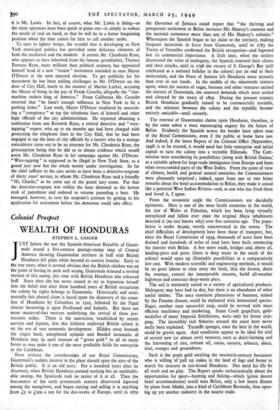MR. TRUMAN'S TROUBLES
By EDWARD MONTGOMERY New York, March 18th
THE United States is rapidly returning to political normal. The President and the Congress are at loggerheads ; the
economic pessimists are predicting the onset of a new depression ; Mr. John L. Lewis has called his soft-coal miners out on a strike that is not a strike but a two-weeks' " holiday "—and another of its periodical municipal government scandals is looming in New York City. That is all as it should be. The essence of American political theory is the doctrine of " checks and balances "- the belief that the common welfare is best served by a system of government in which the struggle for political power is diversified by giving the freest possible play to the largest possible number of contending political groups and forces, so that the power of any one group or force is continually checked and balanced by the power of opposing groups and forces. Under this theory, to expect the machinery of government to run with the well-oiled smoothness of, say, a dictatorship is to expect not only the impossible but the undesirable. If ever the machinery of American government, either national or local, ran smoothly for more than a few minutes at a time without grinding its gears or frictional over-heating, Americans would begin to wonder if they were still living in a free country.
So for the last few days we have had the spectacle of the Congress giving a very pretty demonstration of its power to check and balance the power of the President. On one day alone, last Tuesday, it administered three resounding checks. In the Senate his supporters had to admit defeat in their attempt, personally ordered by Mr. Truman, to outlaw the " filibuster," which stood as an, insuperable obstacle to enactment of his programme of " civil rights " for negroes. In the House of Representatives opponents of the strong rent-control legislation for which he had asked succeeded in writing in a clause giving local option on control to state and municipal authorities, a clause which virtually emasculated the entire Bill. And in the Senate, again, a committee refused to approve his appointment of his personal friend and political crony, ex-Governor Mon Wallgren of Washing- ton, to be chairman of the National Security Resources Board.
All three of these defeats for Mr. Truman came about in each case as the result of an ad hoc coalition of anti-Truman Southern Democrats and Republicans. And bad for him as they were in them- selves, they presaged worse to come. After last Tuesday leaders of the coalition were openly boasting that they had broken the control of the gist Congress by Administration supporters within ten weeks, and that they would now be able to rewrite the whole of Mr. Truman's " Fair Deal " programme along more conservative lines. If they were right, that could mean for Mr. Truman the death of the whole scheme of " civil rights " legislation—Federal laws against the poll-tax, against lynching, against racial segregation and racial discrimination in employment—on which he has set his heart. It could mean no repeal of the Taft-Hartley labour law and its replace- ment by a modified Wagner Act, which Mr. Truman and the Demo- cratic Party had so faithfully promised in their campaign pledges. Labour is not going to forget that promise or forgive Mr. Truman and his party if they fail to fulfil it. It could mean, if not outright defeat, at least serious curtailment of many of the other measures envisaged in his " Fair Deal " policy : higher taxes, economic controls, extension of social security, farm price supports.
But it would be unwise to predict that it will necessarily mean all or even any of these things. The coalition between Southern Democrats and Northern Republicans which has administered these recent defeats is an uneasy alliance—many good Republicans would call it an unholy one. They are united only by their opposition to Mr. Truman on some specific issues. It remains to be seen how solidly that bond will hold them together on other issues where their interests are at variance.
The rejection by the Senate Armed Services Committee of Mr. Truman's appointment of his friend Mr. Wallgren to be chairman of the National Security Board is in another category altogether, and strikes even more sharply at the President's political prestige and prerogatives. Nothing is more personally humiliating for a President—or for those whom he is trying to favour—than to have his personal appointments disapproved. Mr. Truman's appointment of Mr. Wallgren to one of the key posts in the administration of national security followed closely upon that of another intimate political friend, Mr. Louis A. Johnson, to the even more important office of Secretary of Defence. Mr. Johnson, it is true, had had some experience of defence matters as Assistant Secretary of War in Mr. Roosevelt's second Administration. But a good many people attri- buted Mr. Truman's selection of him to replace Mr. James Forrestal less to the energy and ability he had shown in his previous post than to the energy and zeal he had shown in raising funds for the Democratic Party to finance the last election campaign, funds to which Mr. Johnson himself is reported to have contributed $zso,000. In such circumstances it was not likely that Mr. Johnson's appoint- ment would be disapproved by a Senate with a Democratic majority, however much some might dislike the idea that an office so vital to the national security should be made the reward for political services rendered. The rejection of Mr. Wallgren, however, shows that henceforward there is likely to be much closer scrutiny of Presidential appointments whose justification is more to be found in the appointee's personal relations with Mr. Truman than in his capacity to serve the Party and the State.
Another of Mr. Truman's appointments has been under fire from another quarter. A week ago Mr. John L. Lewis, President of the United Mine Workers, ordered his 400,000 soft-coal miners to " take a holiday " for two weeks as from last Monday, as, he claimed, a protest against the President's selection of Dr. James Boyd to be director of the Bureau of Mines. Dr. Boyd had actually been acting as director for nearly a year, awaiting Senate confirmation of his appointment. Mr. J...,ewis labelled his miners' " holiday " a memorial to the miners who had lost their lives in mine accidents during the period that Dr. Boyd had been director of the Bureau, which is responsible for the administration of mine safety regulations. As between Mr. Truman and Mr. Lewis, however, the Senate had no hesitancy whatever in its choice, and within three days of Mr. Lewis's announcement a Senate committee had confirmed Dr. Boyd's appointment by a vote of to to t. If Mr. Truman could only come to a working arrangement with Mr. Lewis by which the latter would threaten to call out his miners as a protest against all Mr. Truman's appointments, Mr. Truman would have no difficulty whatever. If there is one man in the country wbo can count upon unanimous Congressional opposition to everything he says and do: s, it is Mr. Lewis. In fact, of course, what Mr. Lewis is doing—as the mine operators have been quick to point out—is simply to reduce the stocks of coal on hand, so that he will be in a better bargaining position when the time comes for him to call another strike.
To turn to lighter things, the scandal that is developing in New York municipal politics has provided some delicious elements of both the mediaeval and the modern. A certain Mr. Clendenin Ryan, who appears to have inherited from his famous grandfather, Thomas Fortune Ryan, more millions than political acumen, has appointed himself head of a new "fusion" movement intended to oust Mayor O'Dwyer at the next mayoral election. To get publicity for his movement he has been nailing challenges to Mr. O'Dwyer on the door of City Hall, much in the manner of Martin Luther, accusing the Mayor of being in the pay of Frank Costello, allegedly the " slot- machine rackets king of America." From California Mr. Costello retorted that " he hasn't enough influence in New York to fix a parking ticket." Last week, Mayor O'Dwyer retaliated by unearth- ing a " conspiracy " to tap the telephone lines of himself and other high officials of the city administration. He reported obtaining a confession from one Kenneth Ryan, a retired detective and " wire- tapping " expert, who up to six months ago had been charged with protecting the telephone lines in the City Hall, that he had been engaged to tap the lines of city officials by a lawyer who by a strange coincidence turns out to be an attorney for Mr. Clendenin Ryan, the presumption being that he did so to obtain evidence which would assist Mr. Clendenin Ryan in his campaign against Mr. O'Dwyer. " Wire-tapping " is supposed to be illegal in New York State, so a grand jury now has the whole matter under investigation. So far the chief sufferer in the case seems to have been a detective-sergeant of thirty years' service, to whom Mr. Clendenin Ryan said a friendly "Hi, Charlie," as he came out of the grand jury room. For that the detective-sergeant was within the hour demoted to the lowest rank of patrolman and ordered to resume pounding a beat. He managed, however, to save his sergeant's pension by getting in his application for retirement before the demotion could take effect.















































 Previous page
Previous page